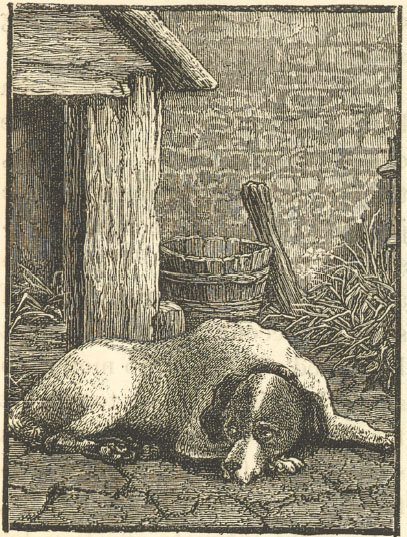Killing the Watch Dog
by Spurgeon
The Cottager and Artisan, vol. 279, issue 3 (1884)
Pages 30-31

Introductory Note: “Killing the Watch-Dog,” written by Spurgeon (perhaps Baptist preacher Charles Haddon Spurgeon), was written for children and adolescents. Its form and purpose are similar to those of Christ’s parables in the Bible, a short narrative using symbols from everyday life to illustrate a principle or moral. This story was published in The Cottager and Artisan, a religious periodical printed by The Religious Tract Society. Written during a time when moral and social values were constantly being examined and questioned, “Killing the Watch-Dog” acts as a cautionary tale, advising its readers to be long-suffering and vigilant.
Well, sir, I will give a picture of yourself. There is a foolish farmer yonder in his house. It is the dead of night; the burglars are breaking in—men who will neither spare his life nor his treasure. There is a dog down below chained in the yard; it barks and howls again.
“I cannot be quiet,” says the farmer, “my dog makes too much noise.”
Another howl, and yet another yell. He creeps out of bed, gets his loaded gun, opens the window, fires it, and kills the dog.
“Ah! it is alright now,” he mutters; he goes to bed, lies down, and quietly rests.
“No hurt will come,” he says, “now; for I have made that dog quiet.”
Ah! but would that he could have listened to the warning of the faithful creature. Ere long he shall feel the knife, and rue his fatal folly. So you, when God is warning you—when your faithful conscience is doing its best to save you—you try to kill your only friend, while Satan and Sin are stealing up to the bedside of your slothfulness, and are ready to destroy your soul for ever and ever.
What should we think of the sailor at sea who should seek to kill all the stormy petrels, that there might be an end to all storms? Would you not say—
“Poor, foolish man! why, those birds are sent by a kind Providence to warn him of the tempest. Why need he injure them? They cause not the tumult; it is the raging sea.”
So it is not your conscience that is guilty of the disturbance in your heart, it is your sin; and your conscience, acting true to its character, as God’s index in your soul, tells you that all is wrong.
Word Count: 318
Original Document

Topics
How To Cite (MLA Format)
Spurgeon. “Killing the Watch Dog.” The Cottager and Artisan, vol. 279, no. 3, 1884, pp. 30-1. Edited by Mark Croshaw. Victorian Short Fiction Project, 6 February 2026, https://vsfp.byu.edu/index.php/title/killing-the-watch-dog/.
Editors
Mark Croshaw
Cosenza Hendrickson
Alexandra Malouf
Posted
25 January 2021
Last modified
5 February 2026



